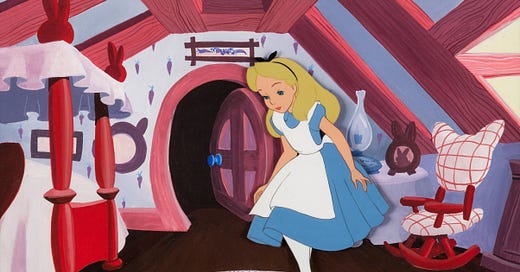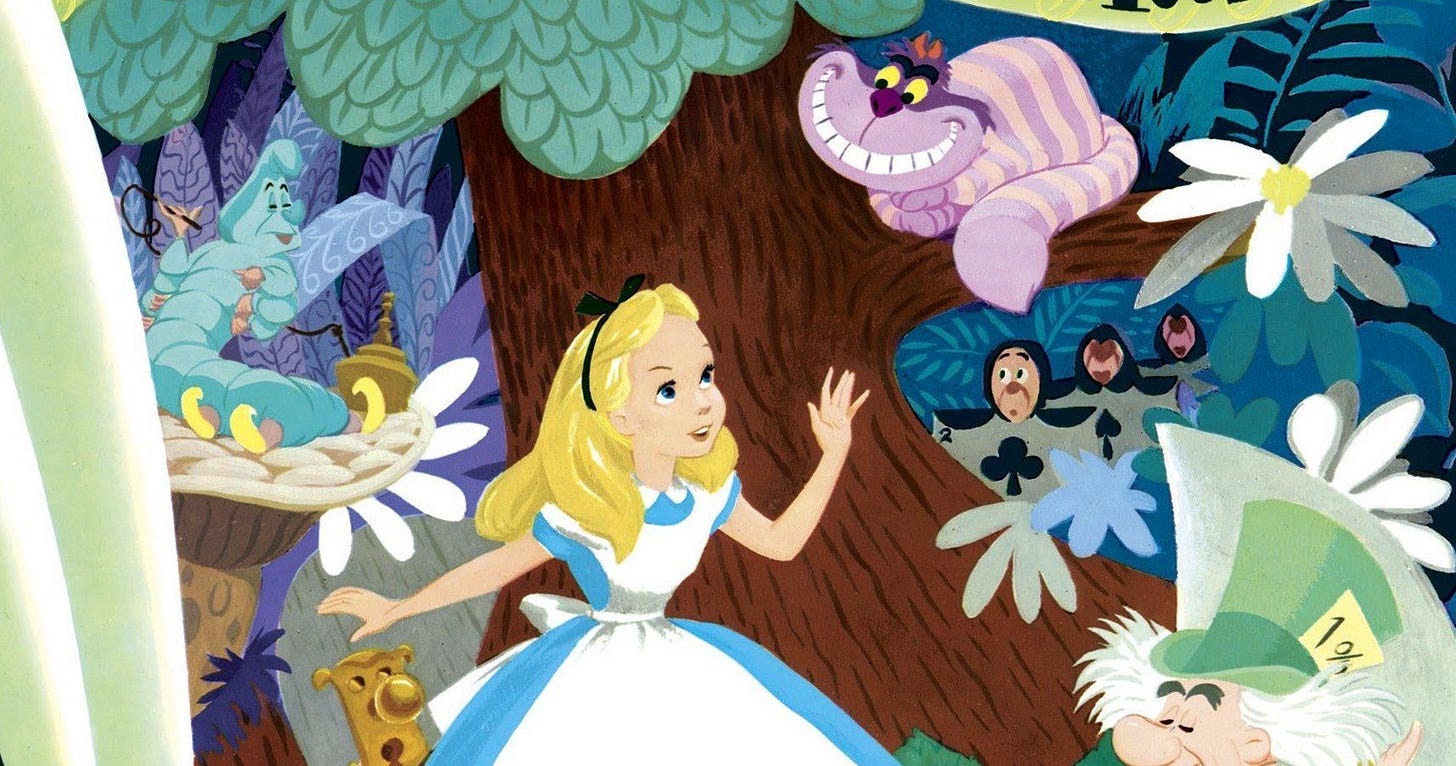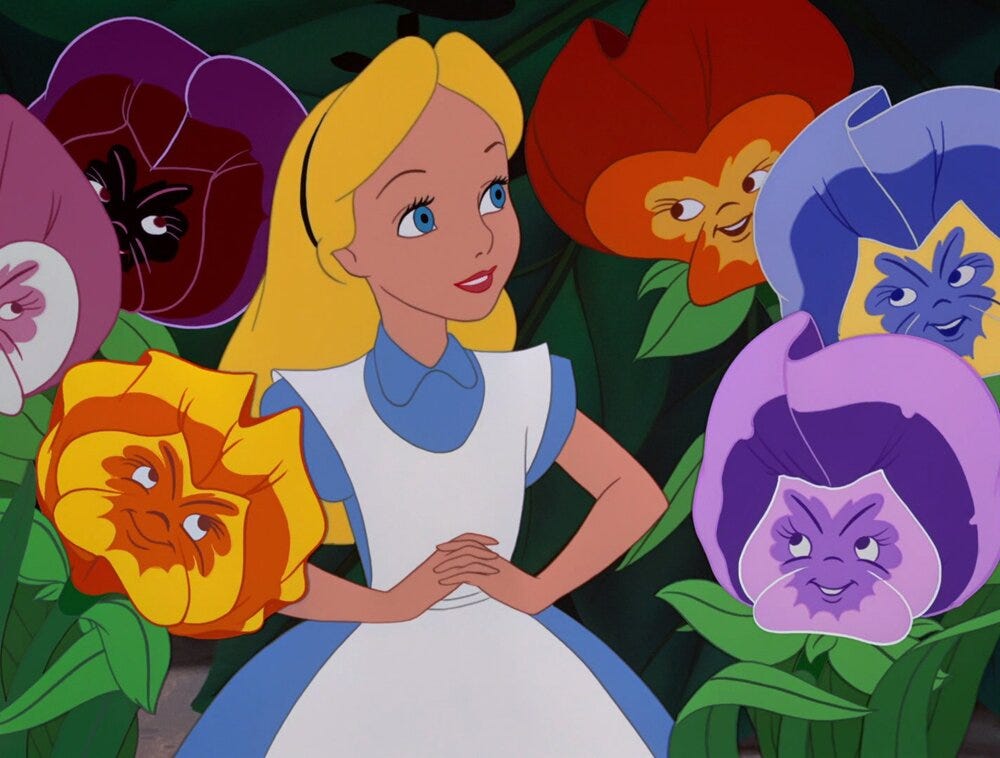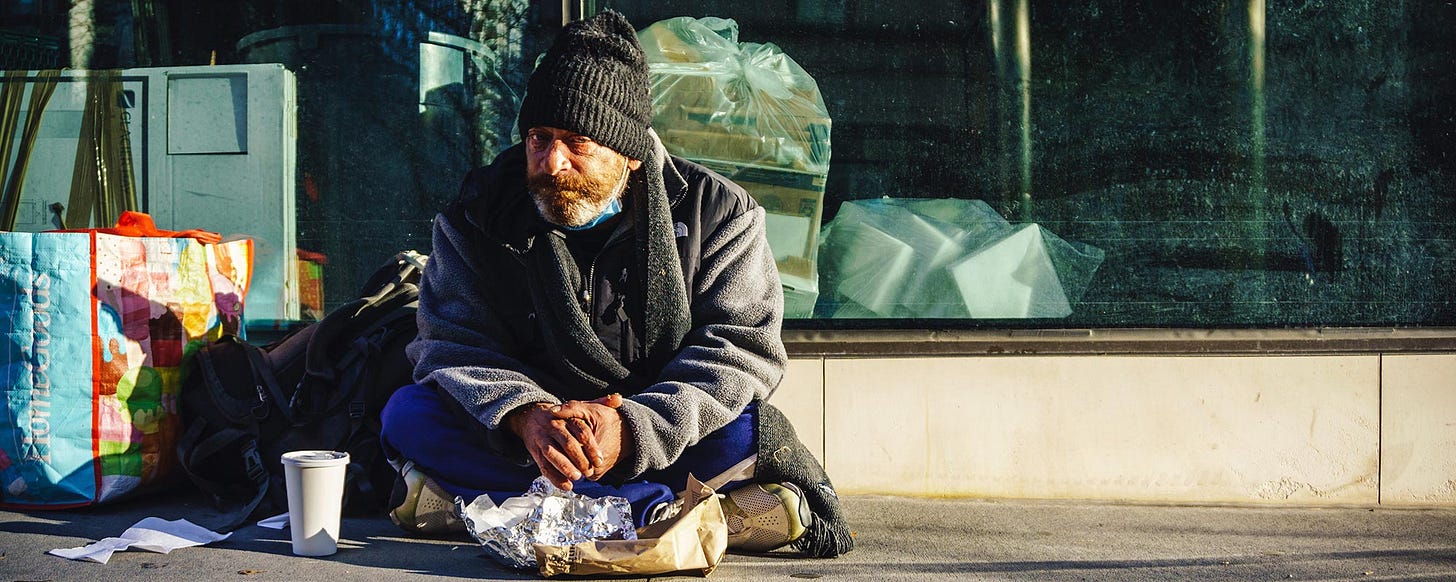“Alice’s Adventures in Wonderland:” An Interpretation
By Stephen Wilson, one of our reporters abroad
"It was much pleasanter at home," thought poor Alice, "When one wasn't always growing larger and smaller, and being ordered about by mice and rabbits. I almost wish I hadn't gone down that rabbit-hole—and yet—and yet--it's curious, You know, this sort of life! I do wonder what can have happened to me! When I used to read fairy tales, I fancied that kind of thing never happened, and now here I am in the middle of one! There ought to be a book written about me, and there ought! And when I grow up, I'll write one—but I am grown up now," she added in a sorrowful tone: “at least there's no room to grow up any more here" {page 40 “Alice's Adventures in Wonderland,” 1983, London: Chancellor Press}.
The quotation is from “Alice's Adventures in Wonderland and can resonate directly with the experience of some homeless people who feel they have plunged down a rabbit hole and got trapped in some dark fairy tale! In this respect it is worth noting that contrary to many assumptions, fairy tales are not all far-fetched, naive or even comforting. On the contrary, they mirror the worst nightmares.
Even the idea of falling down a rabbit hole from Lewis Carroll's work “Alice's Adventures in Wonderland” {1865} suggests plunging into a bewildering scenario or beginning a journey which feels so out of control that it gets worse and worse. You enter a hostile environment of extremes without a clear and consistent logic.
In Russia, even the most absurd fairy tales assumed an air of reality or rather unreality mirrored in real events. It is perhaps no accident that one of the only countries visited by Lewis Carroll was Russia.
Some say it inspired his later novel “Through the Looking Glass” {1872}. The Folklorist Robert Chandler wrote, “The Soviet Union was after all, a world where vast numbers of people lived through experiences that the citizens of most countries encounter only in nightmares and or fairy tales.... Hundreds of thousands of people were snatched up without warning, swept away to a distant realm of snow and ice and then returned to their homes after the passing of ten, twenty, even thirty years.
Early Soviet propaganda claimed that, thanks to the party, fairy tales had become reality; there was more to the truth of this than is immediately apparent” {Pages 222-223, “Russian Magic Tales from Pushkin to Platonov,” 2012, London: Penguin Classics, London}. In this case we imply the dark side of fairy tales.
Many people rendered homeless at first can't believe how suddenly it begins and report "It all seems like a dream." What was once taken from granted, has immediately become highly problematic. The world no longer seems so friendly but turns into an alien, inhospitable and hostile environment where everything is turned upside and down and their own bodies can drastically alter.
There are seemingly endless interpretations of “Alice's Adventures in Wonderland.” Some emphasize it reflects the difficulties of growing up through adolescence, of how a child is forced to conform to the repressive Victorian rules enforced in Victorian England or how children were exposed to a premature death from illness, accidents and terrible working conditions. But I think that the events of chapter three best serve to mirror the constant predicament of many homeless people.
For instance, in this chapter, Alice and some animals are all wet and have come ashore. Their first task is to 'get dry.' The chapter begins: “They were indeed a queer-looking party that assembled on the bank—the birds—the birds with draggled feathers, the animals with their fur clinging close to them, and all dripping wet, cross and uncomfortable.” The mouse makes an arousing speech promising to make them dry again by telling them the driest story. The mouse tells an odd story in vain. The story doesn't make them dry. But the Dodo suggests instead they get dry by taking part in a Caucus race. He can't explain what it is but they start running around for half an hour in a race which has no clear rules and everyone is declared a winner and obtains a prize.
Later in the chapter the mouse lives up to his promise to tell Alice a story as to why he hates cats and dogs. But when Alice interrupts his story, he becomes offended and runs away while the other animals also desert her in fear when she tells them about how good her cat is at catching mice and birds.
So in what three ways does this story echo the experience of the homeless? Firstly, the homeless often have to keep dry and on the move. Keeping your feet dry is not straightforward. Some homeless are estimated to go on foot five hours a day. Their footwear gets worn out and their feet are easily exposed to becoming wet or filled with moisture. In Moscow many homeless get severe frostbite which can lead to amputations rendering them invalids. I have lost count of the homeless I have seen walking around the city on clutches. Keeping your feet dry is a constant challenge. There have been some cases of the homeless getting trench foot. This is a condition where pathogens can get into the feet via lice and severely damage the feet and other organs. It is mainly caused by prolonged exposure to cold and moist conditions.
Soldiers during wartime were especially vulnerable to this because they were forced to stay in water filled foxholes and trenches for long periods. They would often forget to take off their boots , change their socks and wash their feet.
The American army in World War II had to issue three pairs of socks to soldiers, insist they keep an extra dry pair in their helmets, regularly change their socks and use the buddy system where they worked in pairs where they would take turns to clean each other's feet.
The homeless often get athletes’ foot, fungus, and ingrown toe nails. One of the worst problems is that they can't sleep with their legs lying up and this means getting excess fluid, or edema, in their legs—leading to damage of the veins and other dangers. How to keep one’s feet in prime condition is a constant problem indeed.
A second point is all the animals taking part in a caucus race. In this race there are no clear rules of where and when to begin or finish. “There was no ‘one, two, three, and away,’ but they began running when they liked, and left off when they liked, so that it was not easy to know when the race was over” {page 33, “Alice's Adventures in Wonderland”}. Afterwards , “Everyone has won, and all must have prizes." The homeless find themselves in a race where there are often no clear guidelines or rules.
There is practically no 100% fool proof guide as to how to survive on the journey of being homeless because the rules are being broken all the time. For instance, though it is recommended by some to stay at a shelter for the homeless to avoid the cold, you can be exposed to being infected, robbed and abused. Entering such a shelter is equivalent to going down a rabbit hole. Anyone with a bit of sense would avoid such places. It is not clear what winning means in the caucus race. But it is also often unclear what winning and losing in America means.
We seem to be taking part in an absurd over competitive race where the rules are unclear. We have a situation where the rules of life are no longer clear but ambiguous, absurd and opaque . For instance, when does a child cease to be a child? Joseph Campbell once stated that that America had no clear rites of passage which carefully defined the age adulthood begun. In each American state, adulthood is defined differently.
If Alice was confused in wonderland about growing up too big too quickly then perhaps it is the opposite today. Now it is common for adult children are staying longer at home with their parents because they cannot afford to rent their own homes. The dodo 's proposal (as in the novel) that everyone is a winner might not seem so illogical. At least the Dodo does not cruelly divide people up into total losers or non-winners, instead choosing to be nice to everyone.
Thirdly, The mouse does not get round to finishing his story as to why he hates cats and dogs. Alice keeps interrupting him with stupid questions and making some silly comments. This often happens when some homeless tell their story to some people. People don't listen to stories and instead interrupt them and fail to believe them.
It comes as no surprise that many homeless people become taciturn, remote or 'silent as a partisan' as they say in Russia. In both Russian and Scottish Folklore, it has been considered a blasphemy to interrupt a storyteller as bad things would later happen.
However, the mouse does tell a story where it talks of an encounter where he is threatened to be put to death by another animal who decides to act as jury, judge and executioner. In this novel the animals, like the homeless, can expect no justice from not only the authorities but all kinds of predators.
Perhaps Lewis Carroll was on to many things. We can even find a bit of ourselves in his narrative.
Hence his genius in being able to keenly grasp the plight of so many people undergoing a dramatic plunge down different rabbit-holes!






